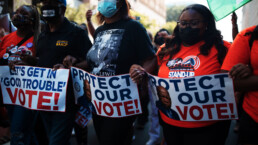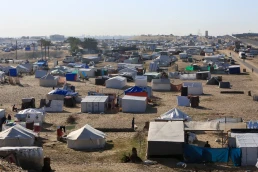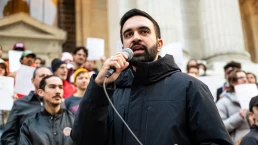Voting laws in 2024 are largely more restrictive than in 2020, and the Biden Administration shouldn’t underestimate the anger many voters have over its support of Israel.a
by Sravya Tadepalli, Prism
As the 2024 election approaches, organizers are working hard to preserve voting rights in states that have made it drastically more difficult to vote.
After record voter turnout in 2020, several states, including Georgia, Florida, and Iowa, took steps to make voting more difficult. Some reduced drop box access, and others limited vote-by-mail or shortened voting times. Voting rights organizations across the country are fighting to curb the impact of these laws by challenging them in court while also trying to help voters navigate obstacles that keep them from exercising their democratic right.

Grassroots organizations such as Black Voters Matter (BVM) and Fair Fight work to increase voter turnout in places facing restrictive measures. BVM focuses their organizing work in the nine core states: Texas, Mississippi, Louisiana, Alabama, Georgia, Florida, North Carolina, Michigan, and Pennsylvania. To minimize barriers to voting, BVM does the people-to-people work of knocking on doors, conducting church outreach, and giving voters rides to the polls. The voting rights organization Fair Fight focuses specifically on Georgia, and it has been instrumental in combating unfair voting laws and organizing voters across the state.
In states like Texas, Georgia, and Florida, national organizations such as the Brennan Center for Justice have also been on the front lines of legal challenges to voter suppression. The Brennan Center is currently suing the state of Texas over Senate Bill 1, a new law that bans drive-thru voting and hinders election officials’ ability to stop poll watcher harassment. The Brennan Center also previously sued Florida for failing to provide guidance to people convicted of felonies about their eligibility to vote, which led some previously incarcerated people to be prosecuted for mistakenly registering to vote.
Recent Posts
Stop Israel’s Dystopian “Humanitarian City” Plan—Before It’s Too Late
July 11, 2025
Take Action Now For the past 20 months, the world has watched—and largely enabled—a genocidal campaign in Gaza. Over 55,000 Palestinians have been…
The “Liberal” International Order Is Criminalizing Palestine Protests
July 11, 2025
Take Action Now As Western governments repress Palestine solidarity and enable Israel’s impunity, the “liberal international order” is no longer…
Politicians Are Betraying Gen Z On Climate
July 10, 2025
Take Action Now While Gen-Zers thrift, knit, crochet, and find other ways to reduce our footprints, Trump and the GOP are greenlighting more climate…
Trump’s Deportation Threat Against Zohran Mamdani Is Shameful
July 10, 2025
Take Action Now In only half a year of Donald Trump’s presidency, he and his allies have turned deportation into an explicitly political threat…




